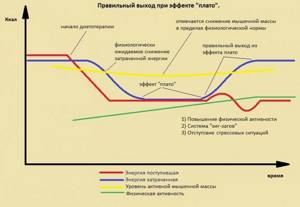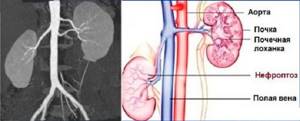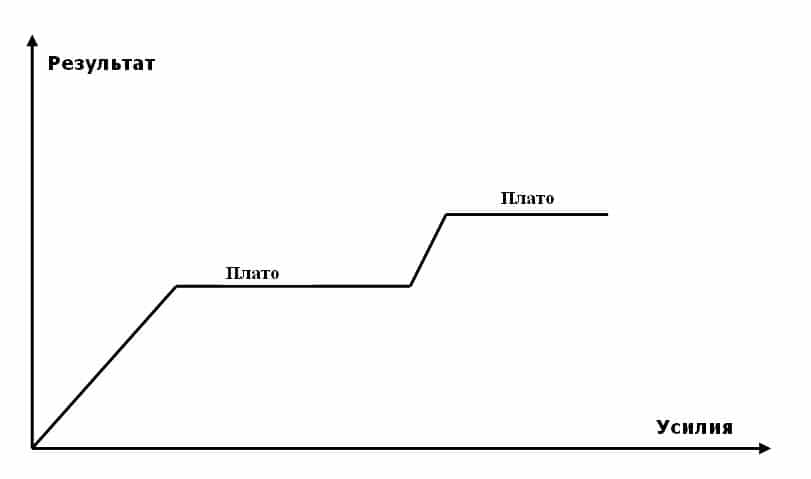You are successfully moving forward on the path to your ideal weight and at some point - bam! - as if the arrow on the scales gets stuck. Kilograms of fat that went away without much effort cling to your body with all their might. Whatever you do, whatever effort you make, is in vain. For a week, two, or even a month, the weight does not budge. You shrug your shoulders, ready to raise your hands in the air and say, “That’s it! Enough for me."
Sound familiar? So why doesn't the weight come off anymore? How to overcome stubborn stagnation?
Let's delve into the study of this effect and find ways to overcome it.
Weight loss plateau or fat burning plateau?
A weight loss plateau is a period in which your weight does not change. If this happens within two weeks, does this really mean that the process has stalled?
Of course not!
The phrase “weight loss” does not describe changes in fat mass, muscle mass, or water volume in the body.
We always trust the scale, sincerely believing that it shows changes in body fat mass. When the value on the scale shows minus 0.5 kg, then we hope that this is a loss of pure fat, and not muscle or water.
If you weigh yourself every day, or several times during the day, you have probably noticed that your weight constantly fluctuates by 0.5 - 1.5 kg. In 85% of cases, fluctuations occur due to changes in the amount of fluid in the body.
For example, if you consume a lot of salt, carbohydrates, and drink little fluid, your body will retain a large amount of water and your weight will increase. But if you drink enough fluids, control your carbohydrate intake, eat little salt, and just finished a sweat-intensive workout, your weight could drop a couple of pounds. Believe it or not, the more water you drink, the less moisture your body retains . This unpredictable behavior of water in the body is one of the reasons why it is enough to weigh yourself once a week, for example on Monday mornings. Unless daily weighings serve as the main motivator for losing weight.
Weighing yourself several times a day is a direct path to loss of self-confidence and confusion in your head.
What is this
The plateau effect is a period in weight loss when weight loss stops, despite following a diet and exercise - despite all efforts, the loser gets stuck at the same number.
Of course, it seems to us that weight loss should occur linearly, without jumps and surprises (and why do we need surprises in this matter, right?). And in theory, this is what is meant: a rare article on the Internet touches on this topic.
However, in real life, with a real person, and not a spherical horse in a vacuum, who eats only boiled breast and buckwheat with a bite of protein and trains like an athlete preparing to represent his country at the Olympic Games, everything happens differently.
It is impossible to say exactly when this phase begins - it depends on individual moments. So it is unclear how long this effect will last - we are all different, some people experience this “trouble”, while for others it can last almost a month!
People, especially those who are losing weight from a lot of weight, are always happy at the beginning of how quickly the extra pounds begin to leave their waist. It seems that this will always happen, but alas, after a couple of weeks the process stops.
And it seems like you are doing the same thing, maintaining a deficit in the same way and playing sports - but there is still no result, the weight has stopped. What are the reasons?
When does a dietary plateau occur?
First, you actively lose weight. Almost every day, scales delight you with plumb lines. At the same time, the stomach on the sides begins to fall in, the cheeks become smaller, and the hips become slimmer. You are happy, and this joy gives you more and more strength on the path to achieving a slim figure.
It is unknown how long it will take for the plateau effect to occur. Everyone has their own period. But it definitely comes when the body has lost a significant amount of excess weight. For a person who wants to lose weight from 60 kg to 50, the dietary plateau will occur at around 55 kg, and for someone whose initial weight was, say, 130 kg, the plateau may occur after losing 30, 40 or 50 kg of excess weight.
Why the weight loss process stopped during the diet: reasons
That's how it should be! The whole point is that in this situation you are giving an incorrect assessment of the current phenomenon. Most likely, before you started losing weight, you didn’t deny yourself anything, ate sweets, starchy foods, etc.

Increasing activity - due to movement in everyday life; Zig zag - periodic dietary relief.
If, when losing weight, you switched to a well-trained, canonically “correct” healthy diet, and even from a large weight, you can easily lose as much as 5-6 kg. in a couple of weeks. But it won’t continue like this - this is a one-time event.
This whole cool effect appears only by switching to a different diet. This is a one-time effect, it is better to forget about it and focus on weight loss, which goes further. Then it turns out that in a month without these 2 weeks you will lose about 3 kg. And this is the ideal rate of weight loss. There is no trace of a plateau effect when losing weight!
To better understand, we suggest you read our article about edema . People greatly underestimate the fact that the body retains water - obese people have very severe edema.
Not only because of the food that contributes to this, but also because of physical inactivity (lack of movement). Why does weight come off easily after intense exercise? Because you are sweating.
Many people, just starting a diet, think that the body so quickly begins to get rid of “toxins” and fat, but this is nothing more than liquid and substances diluted in it. During the process of losing weight, they leave the body, contributing to the long-awaited weight loss.
However, sometimes this does not help - studies show that most people today are not susceptible to the accumulation of excess weight, but to swelling. They go on diets, subject themselves to physical activity, but all to no avail. Even if they starve, they still won’t be able to lose weight.
A similar effect occurs due to an imbalance of water and salts in the space between the cells. This “excess weight” will never go away due to low-carbohydrate diets or physical activity. And even if he leaves, he will quickly return again.
If you easily gain several kilograms after a feast, then this is a bad sign, indicating an imbalance of salt and water. You definitely need to go to the doctor and check your sugar levels, heart, kidneys and vascular function - swelling is often caused by really dangerous diseases, so don’t waste your time!
But there are other reasons for stagnation in weight loss, which are absolutely physiological and normal. Imagine, the body loses a significant amount of weight (now we are talking about fat, not water) in a relatively short period of time (calculate how long it took you to gain this weight and how quickly you want to get rid of it).
Now the body must “take inventory” and understand the current, new situation. Figuratively speaking, imagine that you have taken out a closet, a sofa and a bedside table from a room full of furniture. What will you do immediately after this? That's right - the rest will need to be moved.
This is especially true for very overweight people, who with a 99.9% probability have visceral obesity. In such cases, the internal organs are on a “cushion of fat,” for example, the kidneys. And if you lose weight quickly, organ prolapse is possible.

Sudden weight loss is fraught with kidney prolapse; scientifically this is called nephroptosis. In a trained person, the kidneys are held in place by specially designed ligaments, etc. But when a person gets fat, they begin to be replaced by a “stand” of fat. The ligaments cease to perform their functions and weaken.
In case of sudden weight loss, there is nothing to support the kidneys - there is no more fat, and the ligaments have not yet become stronger. The kidney descends and rises, depending on the position of the body. Problems arise, ranging from minor to very serious. Women suffer from nephroptosis much more often than men; the right kidney is larger than the left.
So a plateau when losing weight is quite normal and even useful - give your body time and it will thank you.
So plateauing is actually okay - it doesn't mean your weight loss is wrong or useless. As we said above, losing weight is not a linear process. This is sometimes a rather long descent along steps, and the plateau is one of them.
The greater the weight, the more likely it is to plateau - there will be several plateaus on the way to the goal, and each new one will likely be longer than the previous one.
Plateaus are usually discussed in a negative light, but this is a good thing because the ultimate goal of any weight loss is a long, lifelong plateau at your new weight. So intermediate plateaus are an opportunity to test your ability to maintain weight.
Plateaus are inevitable and normal. Instead of immediately looking for strategies on how to “break through” it, you can go from the opposite and treat it as consolidating the achieved result, albeit an intermediate one.
Let's discuss how to get out of this situation and defeat your extra pounds?
Plateau in geography
Flat and elevated areas of the earth's surface were formed in different ways. Some were formed by long-term erosion of mountains, others were once sections of the seabed that were then uplifted.
- The Deccan Plateau, for example, was formed from volcanic lava.
- The plateau in Utah, located at an altitude of 1300 - 1400 m above sea level, was before Ancient Lake Bonneville.

- In the central Andes there are two large plateaus, the length of which exceeds 1800 km, they were formed by thickening of the earth's crust, they are called Puno and Altiplano.
- The coldest place on Earth is the Polar Plateau - land around the South Pole, 3000 km above sea level.
What to do?

How to overcome the effect of weight stagnation? How to force the body to lose weight again if the weight has returned?
Many people, in order to break through the plateau, begin to cut calories and add physical activity, although in the end they only make everything worse. And vice versa, people who indulge themselves within the norm begin to lose weight.
It’s difficult to answer unequivocally what exactly this is connected with, but always remember that when losing weight, the most important thing is your psychological comfort. The more psychotic you become and the more nutty you become during the weight loss process, the worse it will be.
And it’s not even about cortisol, which, however, also cannot be written off, but also about the fact that the body can simply reduce your metabolism, which you simply cannot influence - this includes slowing down the rate of fat burning and increasing the rate of storing it, reducing thermoregulation of the body and libido, it will become harder for you to move in normal life, which leads to a decrease in energy costs, and therefore the rate of weight loss.
Let us quote the gorgeous Lyle McDonald as translated by LiveJournal user shantramora:
... Everyone wants energy balance to work this way: a certain caloric deficit is created (compared to the calculated maintenance level) and weight gradually, linearly and evenly decreases at a given pace. From this misunderstanding comes such stupid ideas as “if you cut your diet by 100 kcal per day, you will lose this much weight.”
But the system adapts to changes in energy (food), activity and weight. A simple example: let’s take the thermic effect of food (TEF), calories spent on digestion, breakdown, absorption, etc. food. It is estimated that TEP makes up 10% of your total caloric intake, and if you cut your calorie intake by 500 per day, your calorie expenditure will also be reduced by 50 kcal. So the estimated deficit of 500 kcal has already been reduced to 450 kcal and the estimated figure of half a kilo of fat per week cannot be achieved.
In other words, if the weight loss/fat loss math were as simple as “reduce your food intake by 500 kcal per day to lose a pound of weight per week, and continue until the end,” humans would already be extinct. And we know that everything happens completely differently.
Weight decreases at a certain rate, the decline slows down, and we hit a plateau - this happens even if food intake and physical activity remain unchanged. And the only way to resume weight loss is to create a new deficit by cutting back on food or increasing activity.
And all because the expenditure part of the energy balance equation is dynamic and all its components are subject to change. They change at different rates and in different ranges, depending on many factors. And these changes concern not only what is happening in the short term, but also long-term processes. In the real world, to predict the rate of change in weight or body fat %, you need to take all of these compensatory mechanisms into account...
We described all these problems in detail in the article about why people don’t lose weight , although they try so hard.
What do we personally advise in this situation, how to deal with the effect of stagnation:
- Check the correctness of the KBZHU calculations . Perhaps you have overlooked some mistake and are actually overeating or eating as many calories as your body needs to maintain your current weight.
- Analyze your activity. Sports are not that important for losing weight, calorie expenditure is important, which you can achieve in different ways.
We, of course, are all for working out in the gym, but think about whether you like them at all? Estimate how much you move in everyday life: at work and on weekends? Does iron discourage you from moving after training?
Try to diversify your life with movement that is exclusively pleasant for you? walks, swimming pool, short 5-minute workouts (bending over, squats, stretching) throughout the day. Don’t force yourself, but listen to your body, maybe what you chose just isn’t right for you!
- Have a delicious day or two. Unleash your inner gourmand and take a break from devout eating and even counting calories. Just eat your favorite food without focusing on your hip size and be sure to smile!
Such psychological relief gives excellent results, judging by the numerous reviews of people losing weight of all stripes. Don't turn this into a week-long glutton - 1/2 days will be enough! And don’t stuff yourself with food so much that it’s difficult to breathe - a day of rest is not the same as overeating, listen to your body.
How long can the weight loss plateau effect last?

The duration of stagnation varies from 2-3 weeks to 1-2 months. The average duration of the effect is a couple of weeks. Sometimes the period may drag on and exceed the specified ceiling.
The duration depends on the cause of the phenomenon and on how competent the measures are to get out of the plateau. In some cases, it is enough to adjust your diet slightly to see changes. In others, you have to adapt to the body’s decision and wait much longer. In any case, there is a way out of the situation. The stupidest reaction to stagnation is to give up. By focusing your efforts on solving the problem, you will definitely get out of the deadlock sooner or later. Next - how to overcome the plateau effect.










